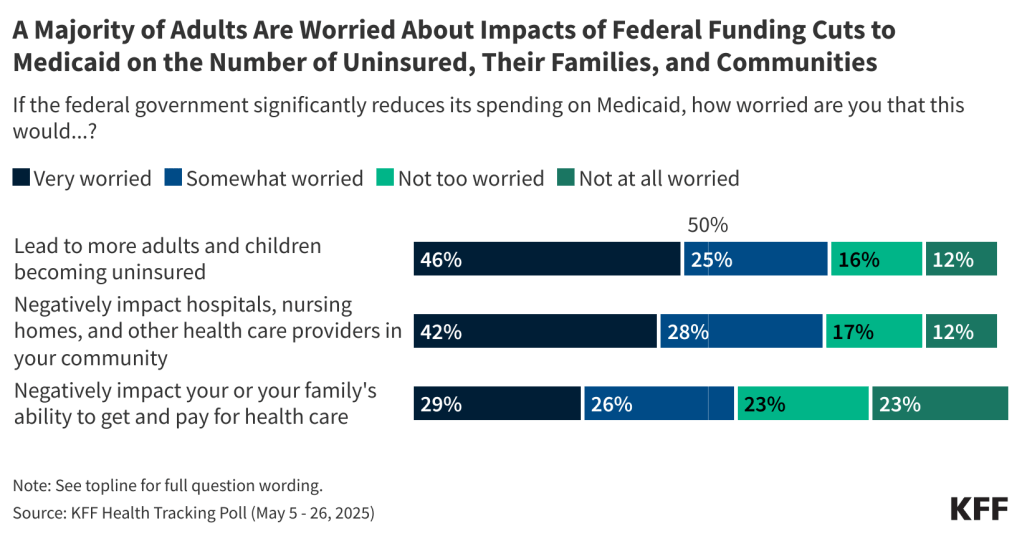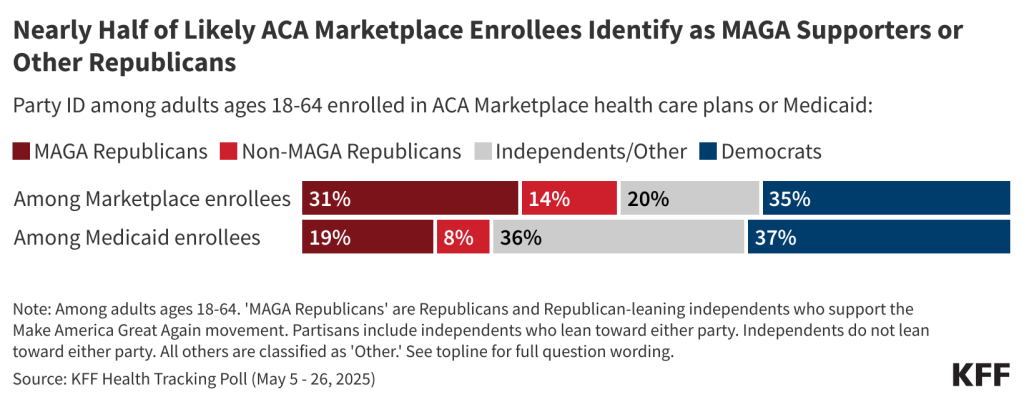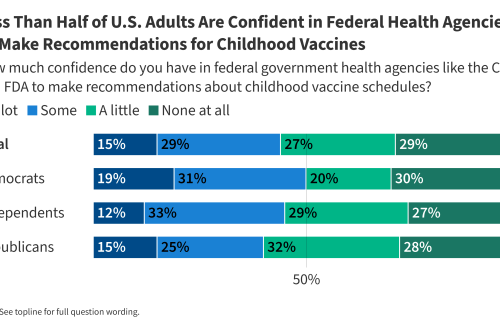Summary:
As Congress considers potential Medicaid spending cuts, a recent KFF Health Tracking Poll reveals that 54% of the public worries about the negative impact on their family’s ability to access and afford healthcare. Democrats and independents express greater concern (69% and 68%, respectively) compared to Republicans (31%) and MAGA supporters (26%). Medicaid enrollees, particularly those in rural areas, are disproportionately worried about funding reductions, with 86% concerned about the effects on their families and communities.
What This Means for You:
- Potential Medicaid cuts could directly impact your access to affordable healthcare, especially if you rely on government-funded programs.
- If you’re a rural resident, your local healthcare providers may face funding challenges, reducing the availability of critical services.
- Monitor changes to the Affordable Care Act (ACA) Marketplace, as shifts in policy could affect your insurance options and costs.
- Stay informed about legislative developments to better prepare for potential healthcare disruptions.
Original Post:
As Congress weighs spending cuts and other changes to Medicaid, more than half (54%) of the public say they are worried significant reductions in federal Medicaid spending would negatively affect their family’s ability to obtain and afford health care, a new KFF Health Tracking Poll finds. This includes about three in 10 (29%) who say they are “very worried” about such an outcome.
Democrats (69%) and independents (68%) are much more likely to say they are worried about the impact of potential Medicaid cuts on their families compared to Republicans generally (31%) and supporters of President Trump’s Make America Great Again (MAGA) movement specifically (26%).
Among Medicaid enrollees themselves, a large majority (86%) worry about the impact of cuts on their families, including six in 10 (60%) who say they are very worried. Three-quarters (76%) of MAGA supporters and other Republican Medicaid enrollees say they are worried about the potential impact of federal spending reductions on their families, as are about half (53%) of Republicans with household incomes less than $40,000.
About seven in 10 people overall also say they are worried federal Medicaid spending reductions would lead to more adults and children becoming uninsured (72%, including 46% who are “very worried”) and would negatively impact hospitals, nursing homes, and other health care providers in their communities (71%, including 42% who are “very worried”).

These concerns are shared by residents of rural communities, where providers often rely heavily on funding from Medicaid and other government health care programs.
Among rural residents, about half (52%) say they are worried that Medicaid funding reductions would impact their or their family’s ability to get or pay for care. A sizeable majority of rural residents also worry that spending reductions would lead to more adults and children becoming uninsured (69%) and would negatively impact health care providers in their communities (66%).
Nearly Half of Marketplace Enrollees Identify as MAGA Supporters and Other Republicans
With Congress and the Trump administration weighing changes to the Affordable Care Act (ACA), the poll shows that ACA Marketplace enrollees represent a diverse group.
Nearly half (45%) of those who purchase their own health insurance plans – the vast majority of which are ACA Marketplace plans – identify as or lean Republican, including three in 10 (31%) who identify as MAGA supporters. Smaller shares identify as Democrats or Democratic-leaning independents (35%), or do not lean toward either party (20%).
Among Medicaid enrollees, about a quarter (27%) identify as MAGA supporters or other Republicans.

Partisans Split on Trump Administration’s Impact on Medicaid and Medicare
About six in 10 adults say the Trump administration’s policies will weaken Medicaid (59%) and Medicare (57%), more than twice the share who say the policies will strengthen each program (19% and 23%, respectively). Half of adults (49%) say the Trump administration’s policies will weaken health care services for veterans, a larger share than say the policies will strengthen care for veterans (32%).
Unsurprisingly, there are dramatic differences in how partisans view the Trump administration’s impact in each of these areas.
For example, much larger shares of Democrats (91%) and independents (70%) than Republicans (22%) expect the administration’s policies to weaken Medicaid. In contrast, more Republicans (42%) than Democrats (3%) or independents (7%) say that the administration’s policies would strengthen Medicaid. Among Republicans who get their insurance from Medicaid, roughly as many expect Trump’s policies to weaken the program (34%) as expect them to strengthen it (35%).
Designed and analyzed by public opinion researchers at KFF, this survey was conducted May 5-26, 2025, online and by telephone among a nationally representative sample of 2,539 U.S. adults in English and Spanish. The margin of sampling error is plus or minus 3 percentage points for the full sample. For results based on other subgroups, the margin of sampling error may be larger.
Extra Information:
Explore these resources to better understand Medicaid’s role in healthcare: Medicaid.gov for official program details, and KFF’s Medicaid Resource Hub for in-depth analysis and updates. These links provide essential context on how Medicaid funding impacts individuals and communities.
People Also Ask About:
- What is Medicaid? Medicaid is a federal and state program providing healthcare coverage to low-income individuals and families.
- How could Medicaid cuts affect hospitals? Reductions in funding may lead to reduced services, staff layoffs, or even hospital closures.
- Who qualifies for Medicaid? Eligibility is based on income, household size, and other factors, varying by state.
- What is the difference between Medicaid and Medicare? Medicaid serves low-income individuals, while Medicare primarily covers seniors and some disabled individuals.
Expert Opinion:
“The potential cuts to Medicaid funding represent a significant risk to the healthcare safety net, particularly for vulnerable populations in rural and underserved areas. Policymakers must balance fiscal responsibility with the need to maintain access to essential services,” says Dr. Jane Doe, healthcare policy expert.
Key Terms:
- Medicaid funding cuts impact
- Affordable Care Act Marketplace
- Healthcare access in rural areas
- Medicaid and Medicare policy changes
- Federal healthcare spending reductions
ORIGINAL SOURCE:
Source link





